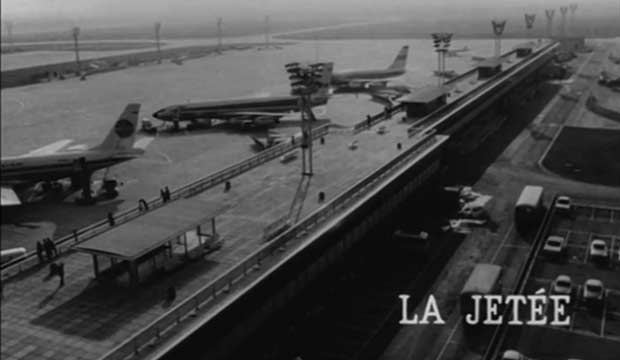
Film Matters: Please tell us about your article that is being published in Film Matters.
Grace Wallace: When we screened La Jetée in our senior seminar, I was struck by its simplicity and, despite this, its capacity to so accurately mirror human emotion within a science fiction setting. The film is so quietly powerful. Yet, given its narrative, Marker could have easily served up a space-and-time-faring epic. In writing this piece, I wanted to understand from where the power of the film derives, how a movie with so little movement fits in among the motion-centric world of cinema.
FM: What research and/or methodologies do you incorporate in your article?
GW: I researched theories of editing and of on-screen space, drawing first on Eisenstein’s writings on montage—I figured it would be central to a film comprising stills—and Bazin’s theories of mise-en-scène. I expanded to writings on theatrical space, which helped me think of Marker’s frames as a kind of stage (within, of course, a larger diegetic world).
FM: Describe the original context for/when writing this article while an undergraduate student.
GW: I wrote this piece as the final paper of my senior seminar in film studies class. It was a graciously open-ended assignment for which I could choose to analyze any of the films we had screened that semester, all of which fell under the category of the class’s title: French Film of the 1960s.
FM: How has your department and/or institution supported your work in film and media?
GW: I place great value on the University of North Carolina Wilmington’s commitment to giving its film students a balanced education, based equally on production skills and the critical study of film. By the time I entered my senior capstone in critical studies, I had an excellent base from which to begin my research on La Jetée. It was the theories of Eisenstein and Bazin that I first applied to the film; I was excited to synthesize information (pertaining to films originating from numerous countries and time periods) from three years of studying film.
FM: How has your faculty mentor fostered your advancement as a film scholar?
GW: Dr. Tim Palmer taught both my introduction to film studies and my capstone course. When I began the major, I had never seen the Japanese films my classmates spoke so highly of, I had never heard of so many of the directors we would screen that semester, and I felt daunted by speaking out in class about I subject I knew so little about. Dr. Palmer introduced me to so many new forms of cinema (art films, avant-garde, international movements) and the theories surrounding them. I finished my degree with confidence, in great part due to his instruction—both because of the wealth of information and the friendly, engaging environment fostered in his classroom.
FM: How has the Film Matters editorial and publication process impacted the development/evolution of your article?
GW: Writing with the knowledge that my work might be published pushed me to write as if my paper would be read by a wider audience, not just by the professor who would supply a grade. My acceptance into the journal helped me realize that I am able to contribute to the film community with original analysis, a concept that seemed foreign to me only three years previous. Knowing I was working with an editorial team, I sought to improve my paper on a higher level, really acknowledging minor details.
FM: What audience do you hope to reach with your Film Matters article and/or what impact do you hope it has on the field of film studies?
GW: With publication in Film Matters, I would like to reach an audience of other young people engaging with film. My greatest hope would be that someone like me, daunted by their introduction to the major, might gain a bit of confidence by realizing, only a couple of years down the line, they might not be so intimidated by the boys currently talking over them in class.
FM: What are your future plans?
GW: Since graduating in December, I have moved down to Florida for the Disney College Program. I hope to use this opportunity as a foot in the door so that I might one day work on the creative side of the company. Currently, I am working on finding publication in literary journals and applying for professional internships with Disney, mostly pertaining to art direction. I plan to pursue a master’s in either film studies or creative writing (my other area of study at UNCW). As soon as I am in the proper environment, there will be many cat adoptions in my future.
Author Biography
Grace Wallace holds a BA in film studies from the University of North Carolina Wilmington, where she also studied creative writing and acted as the art director for Visions Film Festival and Conference. She prefers writing in motion: thinking and scribbling on a train or in the back seat of a car.







































